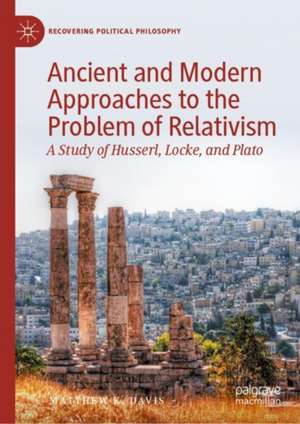Ancient and Modern Approaches to the Problem of Relativism: A Study of Husserl, Locke, and Plato: Recovering Political Philosophy
Autor Matthew K. Davisen Limba Engleză Hardback – 20 mai 2023
| Toate formatele și edițiile | Preț | Express |
|---|---|---|
| Paperback (1) | 620.81 lei 38-44 zile | |
| Springer International Publishing – 6 iun 2024 | 620.81 lei 38-44 zile | |
| Hardback (1) | 693.57 lei 6-8 săpt. | +16.30 lei 10-14 zile |
| Springer International Publishing – 20 mai 2023 | 693.57 lei 6-8 săpt. | +16.30 lei 10-14 zile |
Din seria Recovering Political Philosophy
-
 Preț: 382.95 lei
Preț: 382.95 lei -
 Preț: 382.75 lei
Preț: 382.75 lei -
 Preț: 386.61 lei
Preț: 386.61 lei -
 Preț: 384.86 lei
Preț: 384.86 lei -
 Preț: 357.43 lei
Preț: 357.43 lei - 15%
 Preț: 702.24 lei
Preț: 702.24 lei - 18%
 Preț: 726.06 lei
Preț: 726.06 lei -
 Preț: 382.75 lei
Preț: 382.75 lei -
 Preț: 386.81 lei
Preț: 386.81 lei -
 Preț: 265.36 lei
Preț: 265.36 lei -
 Preț: 211.29 lei
Preț: 211.29 lei - 15%
 Preț: 646.75 lei
Preț: 646.75 lei - 18%
 Preț: 728.28 lei
Preț: 728.28 lei - 8%
 Preț: 487.94 lei
Preț: 487.94 lei - 15%
 Preț: 641.71 lei
Preț: 641.71 lei - 18%
 Preț: 786.98 lei
Preț: 786.98 lei -
 Preț: 201.06 lei
Preț: 201.06 lei -
 Preț: 214.57 lei
Preț: 214.57 lei - 15%
 Preț: 579.20 lei
Preț: 579.20 lei -
 Preț: 176.74 lei
Preț: 176.74 lei - 15%
 Preț: 577.07 lei
Preț: 577.07 lei - 15%
 Preț: 583.61 lei
Preț: 583.61 lei - 18%
 Preț: 777.20 lei
Preț: 777.20 lei - 15%
 Preț: 698.30 lei
Preț: 698.30 lei - 18%
 Preț: 727.97 lei
Preț: 727.97 lei - 18%
 Preț: 786.18 lei
Preț: 786.18 lei -

Preț: 693.57 lei
Preț vechi: 815.97 lei
-15% Nou
Puncte Express: 1040
Preț estimativ în valută:
132.73€ • 137.79$ • 110.68£
132.73€ • 137.79$ • 110.68£
Carte tipărită la comandă
Livrare economică 22 martie-05 aprilie
Livrare express 18-22 februarie pentru 26.29 lei
Preluare comenzi: 021 569.72.76
Specificații
ISBN-13: 9783031223037
ISBN-10: 3031223039
Pagini: 133
Ilustrații: VII, 133 p. 1 illus.
Dimensiuni: 148 x 210 x 16 mm
Greutate: 0.33 kg
Ediția:2023
Editura: Springer International Publishing
Colecția Palgrave Macmillan
Seria Recovering Political Philosophy
Locul publicării:Cham, Switzerland
ISBN-10: 3031223039
Pagini: 133
Ilustrații: VII, 133 p. 1 illus.
Dimensiuni: 148 x 210 x 16 mm
Greutate: 0.33 kg
Ediția:2023
Editura: Springer International Publishing
Colecția Palgrave Macmillan
Seria Recovering Political Philosophy
Locul publicării:Cham, Switzerland
Cuprins
Chapter 1: Husserl and the Problem of Epistemological Relativism.- Chapter 2: Locke and the Problem of the Biblical God.- Chapter 3: Plato’s Solution to the Problem of Relativism.
Notă biografică
Matthew K. Davis is former Dean and Director of Graduate Programs at St. John's College, Santa Fe, USA, where he has taught for twenty-five years.
Textul de pe ultima copertă
“This ambitious study brings together three great thinkers of ancient and modern times—Husserl, Locke, and Plato—in a careful analysis of the problem of knowledge, of what the unassisted human mind can know and how it may know what it does. I know of no other work that even attempts to do what this study does so well: to bring into respectful but critical dialogue with one another these three philosophers on the question “what is knowledge?””
--Robert C. Bartlett, Behrakis Professor in Hellenic Political Studies, Boston College, USA
--Robert C. Bartlett, Behrakis Professor in Hellenic Political Studies, Boston College, USA
Matthew K. Davis is former Dean and Director of Graduate Programs at St. John's College, Santa Fe, USA, where he has taught for twenty-five years.
Caracteristici
Asserts that Plato solved the problem of relativism Demonstrates why we can and should return to Plato to address relativism in contemporary society Offers a clear account of the thought of Husserl, Locke, and Plato
